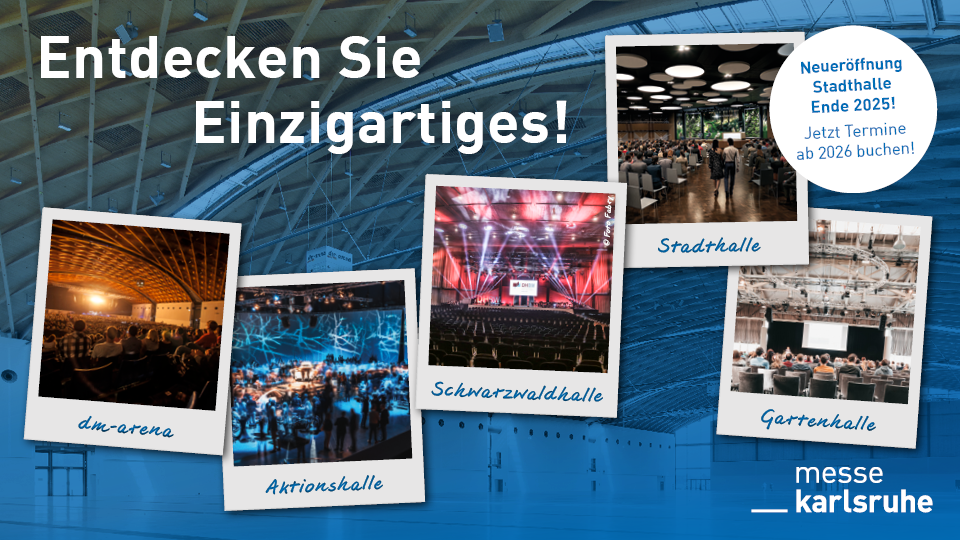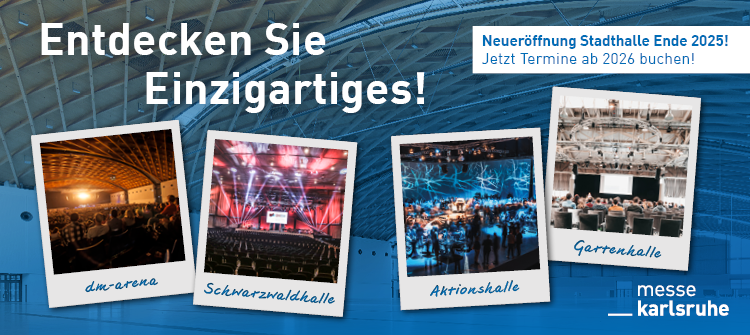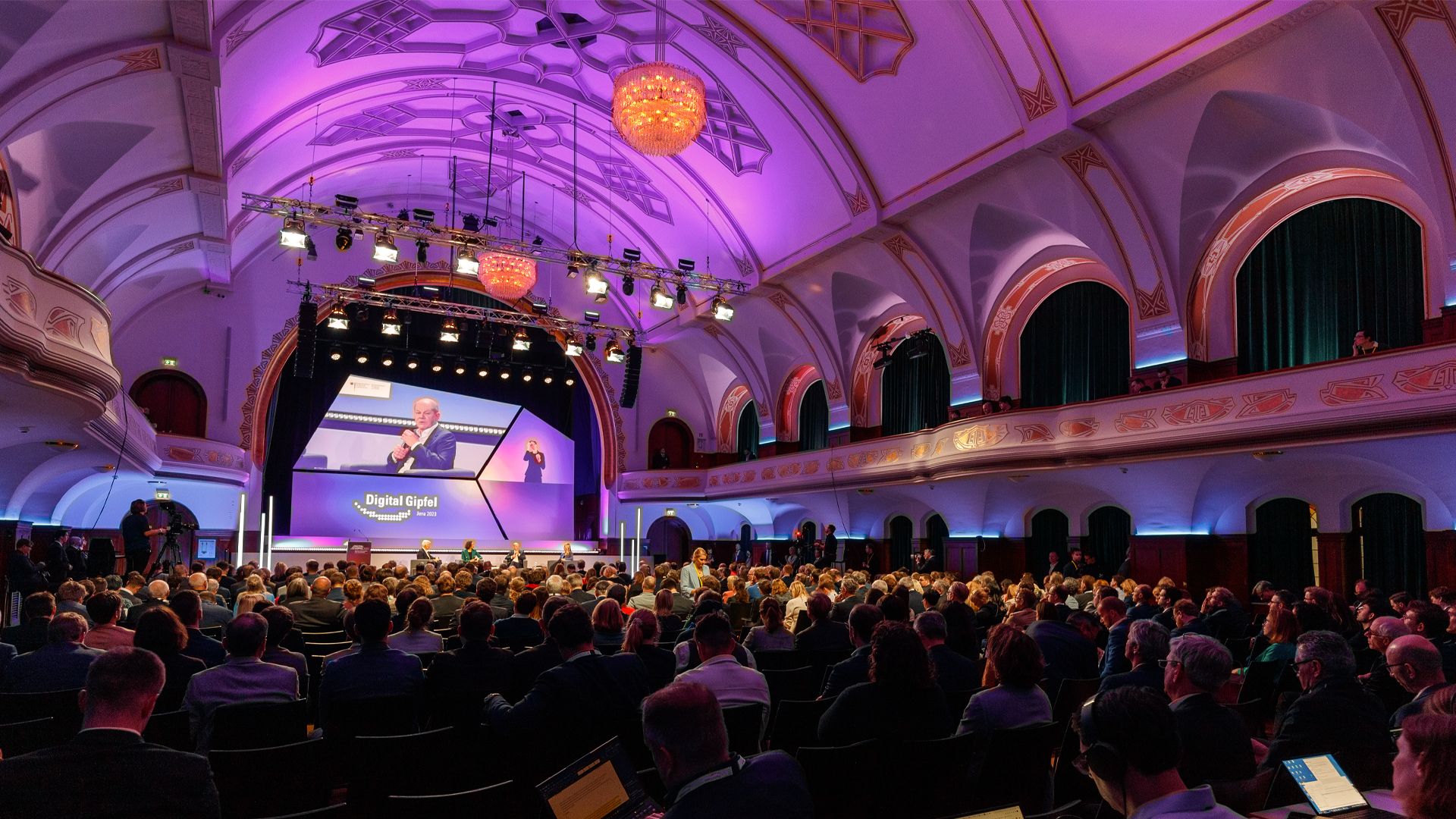
Congress centres
At the centre of the transformation
The Federal Government's Digital Summit 2023 at the Volkshaus Jena focused on the question: How are digitalisation and artificial intelligence changing everyday life? Photo: JenaKultur, Roman Moebius
The Federal Government's Digital Summit 2023 at the Volkshaus Jena focused on the question: How are digitalisation and artificial intelligence changing everyday life? Photo: JenaKultur, Roman Moebius
All industries and professional groups meet in congress centres. This means that the members of the European Association of Event Centres are at the heart of the transformation and are becoming its centres. The topics range from the twin transformation to the transformation of society.
Every goal scored during UEFA EURO 2024 was broadcast via Leipzig. Video and sound were broadcast from Hall 4 of Leipziger Messe, the International Broadcast Centre (IBC). In 2019/2020, Leipziger Messe won the tender with its modern site and technical infrastructure. UEFA was responsible for the technical installations in the exhibition hall and the laying of 59 kilometres of cable, transmitting image and sound material to 130 television and radio stations around the world and five billion people. "The IBC was supplied with 100 per cent green electricity by Leipziger Messe," says André Kaldenhoff. The Head of the Congresses Division at Leipziger Messe is co-organising EURO 2024 for the football tournament.
His team has been working intensively on the power supply for the IBC, as the power requirements are high for the many televisions, computers and screens in the offices as well as the servers in the hall for providing the images to the broadcast partners and transmitting the data to and from the stadiums. As the usual busbars at trade fairs are not sufficient, the Leipzig-based company installs cable feed boxes that draw up to 1,500 amps via Powerlock cable sets, as well as electrical switchover devices between the stationary power supply from the hall and the power generators. Diesel generators and UPS systems provide a back-up power supply.
"We will also be able to offer this reliable solution for powering large productions in the exhibition halls, such as TV shows, to event organisers in the future and supply them with the green electricity that Leipziger Messe purchases or, in some cases, generates itself with its own photovoltaic system," says Kaldenhoff. For the football fan, it was exciting not only to see the result on the screen, but also to get an insight behind the pictures. "That was almost more interesting than the games themselves."
"We have seen that we are able to meet complex requirements with our site and the structure of the group of companies, for national and international organisers with high standards."
André Kaldenhoff, Head of the Congresses Division at Leipziger Messe
Photo: Leipziger Messe
The Leipzig-based company has been working on digital and sustainable transformation for some time now. "It's all about continuously developing services and responding flexibly to changing customer requirements - although often it's just the terms that change," says Kaldenhoff. It is important to empathise with the customer and develop the optimal offer for their needs. Despite all the technical possibilities, he believes that personal consultation and close coordination with the customer are essential in order to solve problems together and break new ground.
Twin Transformation: Creating room for manoeuvre
When asked about the most important transformation topics, Ilona Jarabek mentions twin transformation, artificial intelligence, security and social change. Twin transformation refers to the synergetic interaction and mutual reinforcement of digital and sustainable transformation, and the President of the European Association of Event Centres (EVVC) believes that thinking about digitalisation and sustainability together is the right way forward. Jarabek, who manages the Musik- und Kongresshalle Lübeck, is not only thinking about smart building technologies, such as automated ventilation control and dimming systems, but also about the mobility of participants. The 600 event centres, congress centres, arenas and venues in the EVVC are addressing these issues on the board. Lars Wöhler is the new Board member responsible for sustainability. The twin transformation is also a major topic for the Managing Director of the darmstadtium science and congress centre in Darmstadt. Digitalisation and the sustainable, future-oriented alignment of companies are key drivers of change for him. "The MICE industry is less on the sidelines here, but will play a central role. After all, all sectors are usually present in venues in different ways and understandably have corresponding expectations," explains Wöhler, adding: "In order to remain competitive in the future, we as venues must engage intensively and almost consistently with digital and sustainable change processes." According to Wöhler, this means generating "data, data, data", because without this, it would become increasingly difficult to manage companies. He is thinking of internal data on energy and consumption flows, but also of analysing work processes. Because at the end of the day, every working hour that is avoided is hard cash.
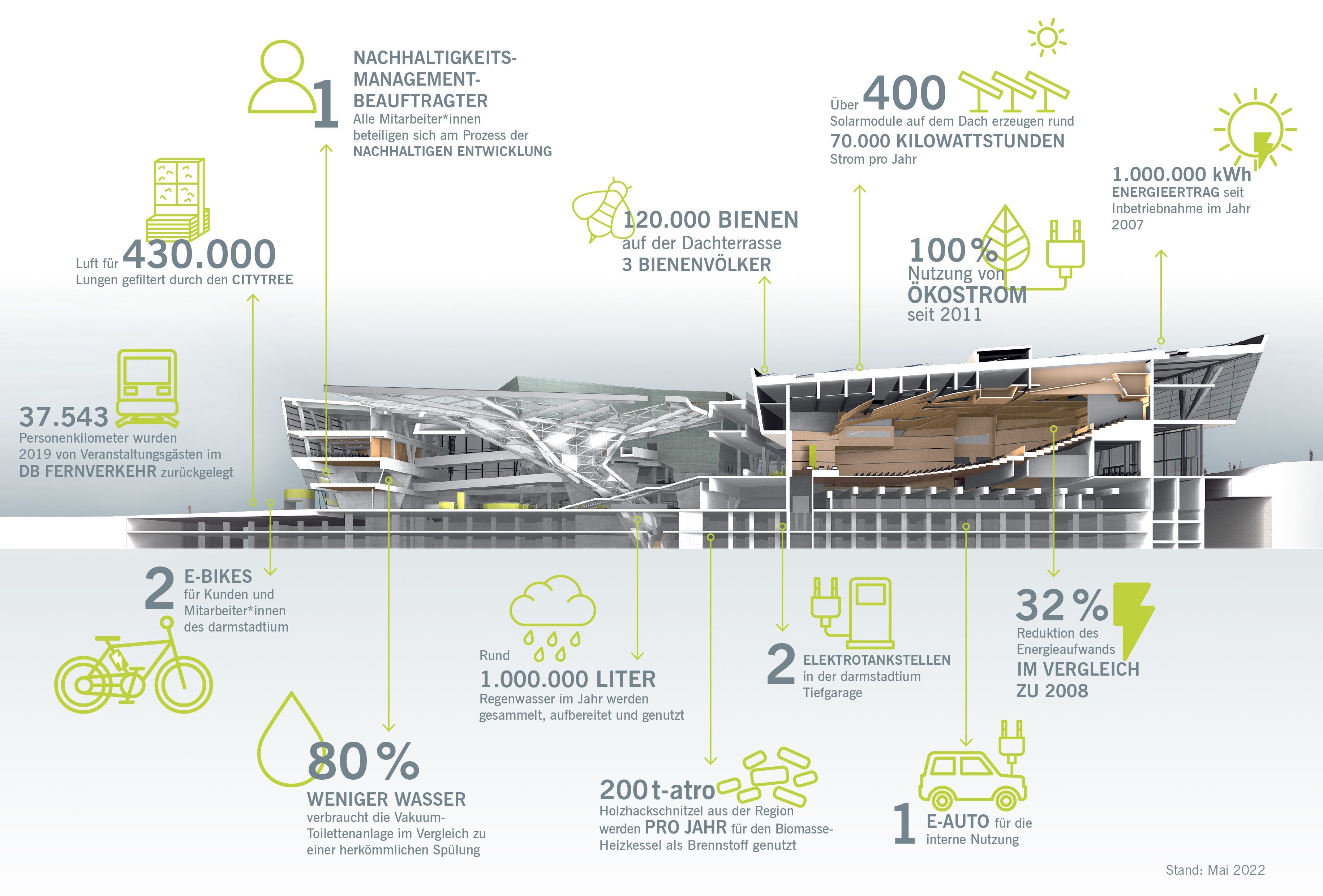
Sustainability was included in the architectural competition for the darmstadtium 25 years ago. The Twin Transformation is intended to support this further. Graphic: darmstadtium
After 25 years, its congress centre is still benefiting from its concept from the architectural competition, with the aim of setting a sustainable urban design accent. Since its opening in 2007, the energy sources have been coordinated with each other - with the exception of wind power, all renewable energy sources are used - and the utilisation processes have been adapted to changing weather conditions and customer requirements. "The fact that the darmstadtium is still the only congress centre with EMASplus certification and the only venue to have won the Incon Digital Infrastructure Award is due not least to the fact that we are constantly developing our business model," says Wöhler. "Especially in times of multiple crises, we are all subject to a constant process of change." The Darmstadt-based company wants to expand its PV system and subordinate over 90 per cent of its supplier flows to sustainability management. Wöhler is not only investing in the infrastructure, but also in his team, as this is ultimately decisive for how successful a twin transformation will be.

"Without the necessary monetary and human resources, a twin transformation will be more difficult to realise."
Lars Wöhler, EVVC board member responsible for sustainability
Wöhler wants to support the centres - especially the smaller ones - in this process. "It will be important to counter the massive rise in costs in particular with clever concepts so that the room for manoeuvre of our colleagues on site does not become even narrower," says Wöhler. One of the smaller centres is the congress centrum weimarhalle, which celebrates its 25th birthday in 2024. Since its opening, 2.5 million guests have attended 5,400 events. "We are authentic and bring people together (in real life)! To achieve this, we are working intensively on the transformation processes," confirms Ulrike Köppel. The Managing Director of weimar GmbH mentions various sustainable and digital transformation projects: the signing of the sustainability code of the event industry fairpflichtet, the switch to LED lighting with energy savings of up to 80 per cent, the installation of 217 solar panels on the hall roof, the modernisation and renewal of the heating and cooling system.
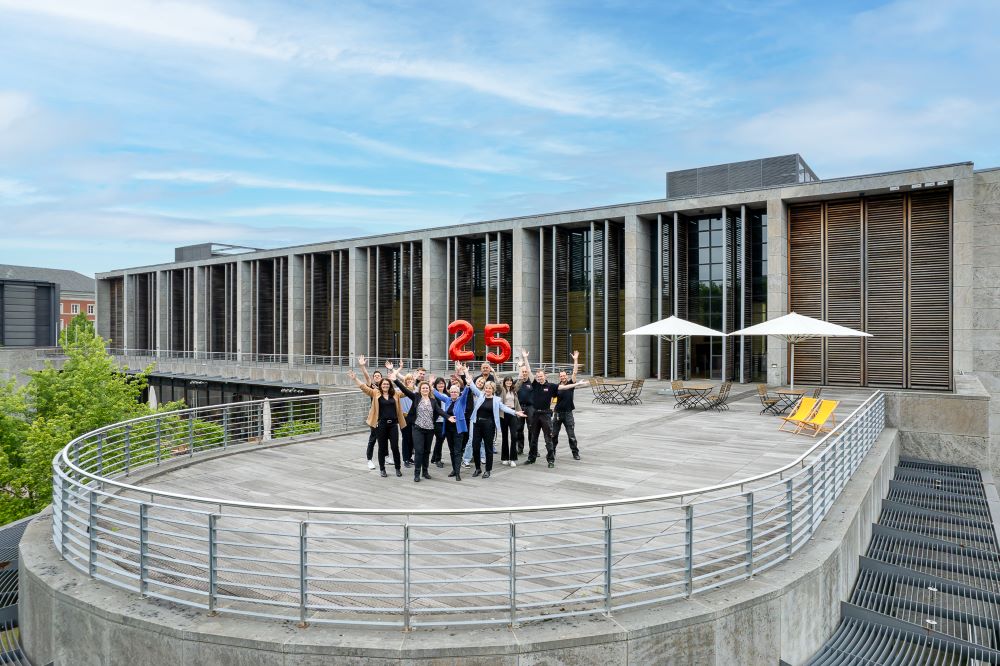
The congress centre weimarhalle is 25 years old. The team hopes for many millions of visitors, glittering celebrations, stimulating discussions at conferences and forward-looking insights at congresses in the future. Photo: Christopher Schmid, weimar GmbH
The pandemic has accelerated these developments. Since then, work meetings have been able to take place online, saving money, time and CO2 emissions. Participants can be connected to hybrid formats and content can be accessed on demand. "An on-site appointment is usually sufficient for preparation, further coordination can take place in online appointments," says Köppel. In the 360-degree tour, impressions can be gained and guided tours can take place online, while a digital event file keeps everyone involved informed. In addition to the twin transformation, she is observing another trend in the event organiser market: the strong individualisation of customers. Köppel: "Smaller metropolises are also increasingly being used for events. People are looking for something unique and special. We see this as a great opportunity for Weimar and our conference location."
Artificial intelligence: feeding in data
It is also an opportunity for Lübeck, the city of EVVC President Ilona Jarabek. The second transformation topic she identifies is the use of artificial intelligence in EVVC centres to free up resources, for example through the use of telephone bots for room bookings or standard enquiries. As Board Member for Communications and Digital Affairs, Carsten Müller listens to the topic of AI in the EVVC centres. The plant manager of JenaKultur recognises that one or two colleagues are using ChatGPT, but that the great possibilities of the AI application are not yet practicable. "At the moment, it's all about generating data and making it available," Müller concludes, adding that this was the focus of the Digital Summit 2023 organised by the German government at the Volkshaus Jena.
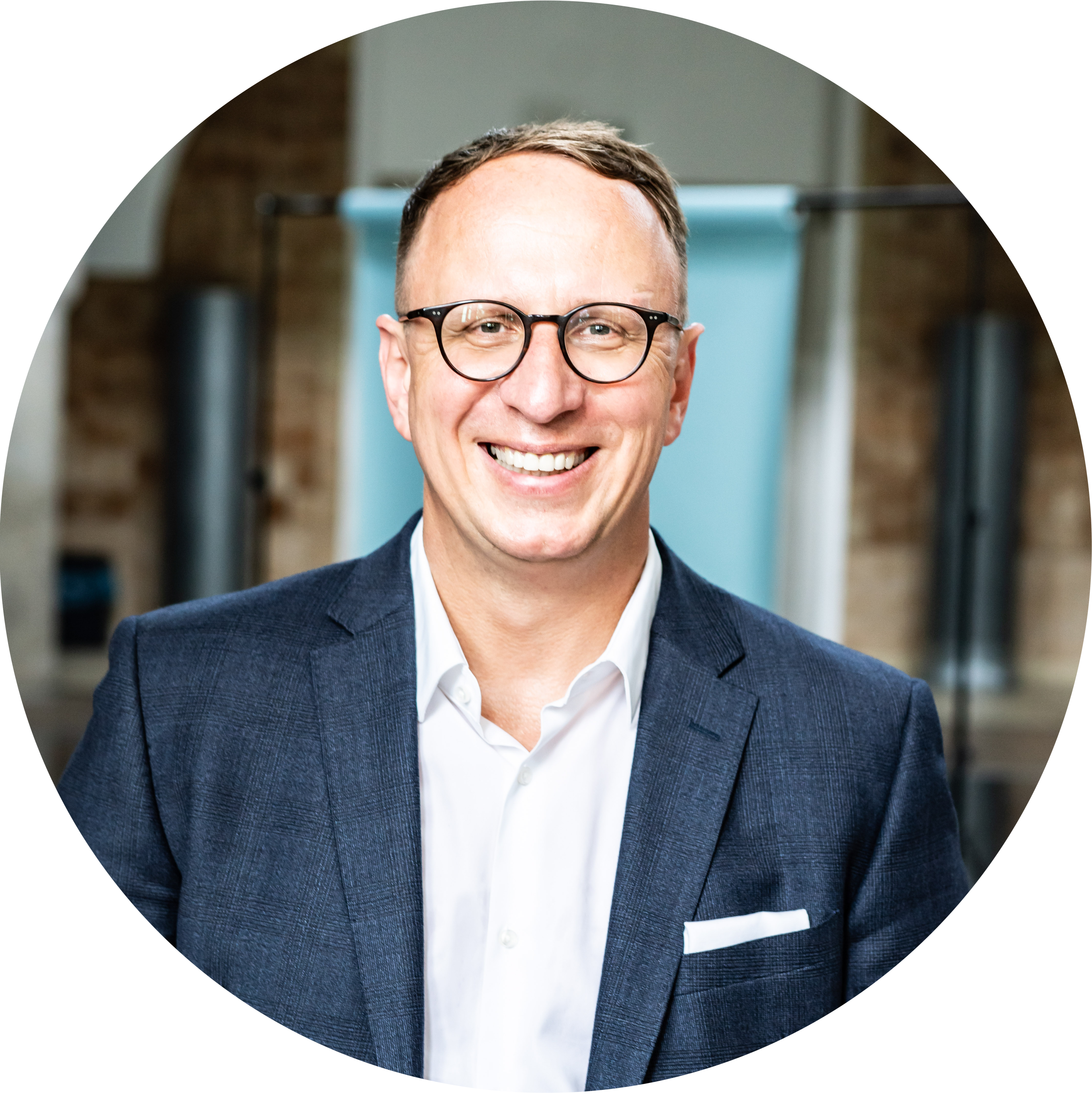
Photo: JenaKultur, H. Gumpert
Carsten Müller, EVVC Board Member for Communications and Digital Affairs and Director of JenaKultur, reflects on the possibilities of using artificial intelligence (AI) in the event industry.
When using artificial intelligence (AI) in the event industry, it is important to realise its areas of application in advance, he says: machine learning, natural language processing and generative AI, i.e. creative AI. "As event organisers and operators, we first need to ask ourselves the question: Which solution do I want to create or use for which challenge? And which data can I make available quickly and comprehensively and in which way?" The EVVC is in dialogue with the GCB - German Convention Bureau on the Open Data project and is clarifying the extent to which public data from EVVC members can be made available so that generative AI applications can access it, for example. Six years ago, the Thuringian Tourism Association (TTG) and partners developed the ThüCAT database on the initiative of the Thuringian Ministry of Economic Affairs. "In Jena, we have been transferring the data from visit-jena.de, jena-convention.de, the Volkshaus and other event venues to ThüCAT for several years now," explains Müller. The Thuringian Convention Bureau has extended this to Thuringia. "The result is a living data network that is directly connected to the digital orbit and provides data for other users," summarises Müller. The data helps to improve the quality of results. He looks ahead to Heilbronn, where the largest eco-system for AI is to be created: the IPAI - Artificial Intelligence Innovation Park.
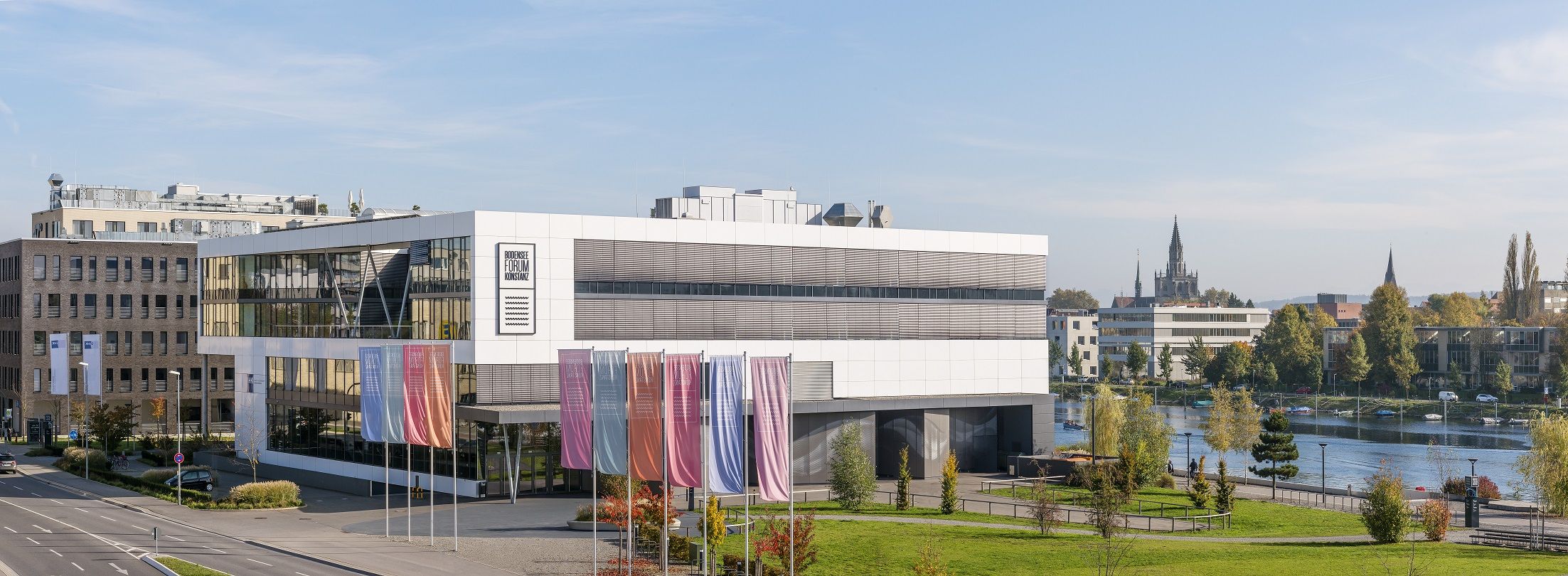
Photo: Guido Kasper
The Bodenseeforum Konstanz: From industrial building to event centre
One building that stands for transformation is the Bodenseeforum Konstanz. In 2010, the city of Constance sells a site for the construction of a Solar Innovation Centre. After the first construction phase, the company is hit by the crisis in the solar industry. The City of Constance and the Hochrhein-Bodensee Chamber of Industry and Commerce acquire the building and share the premises: The city uses the lower half for conferences and events, while the IHK uses the upper half for training courses and as offices. The new Bodenseeforum Konstanz event centre will open on 21 October 2016. "During the pandemic, we realised a digital twin of our building with Prismm for reasons of flexibility. Today, we use our digital twin ViBoFo in sales for digital guided tours to save our customers unnecessary journeys for sustainable reasons, and at the same time we have an interactive solution for hybrid events," explains Sonja Siegner, responsible for MICE Sales & Event Design at Bodenseeforum Konstanz. Topics that concern the Constance-based company are the Inner Development Goals (IDGs), which reflect the values practised at micelab:Bodensee, and DEI (Diversity, Equality, Inclusion), in order to sensitise and advise organisers as early as the event design stage.
Social change: promoting diversity
Despite all the technology, or perhaps because of it, Ilona Jarabek is also concerned with another topic: social change. "Diversity, equality and tolerance are important for cohesion and we - the EVVC - bring people together at events," she emphasises. Due to demographic change and the shortage of skilled workers, the topic is becoming increasingly important and will therefore be addressed in the programme for the MFT EVVC Symposium in the StadtHalle Rostock on 24 and 25 September 2024. Ilona Jarabek emphasises: "When it comes to diversity, we must also focus on the still untapped potential of women. Demographic change and an increasing demand for labour - our society cannot afford to ignore the potential of women, whether in management positions, returning to work or starting a career in general." An idea that she would like to extend to all people. One woman in a management position is Kristina Wulf. The operations manager at Eurogress Aachen sees the use of artificial intelligence and new technologies as a way to counter the shortage of skilled labour. "How can we make our work processes more efficient with AI? That's the next project we're tackling," announces Wulf. All employees were asked about this in a future workshop. The Aachen-based company is doing a lot to combat the shortage of skilled labour, for example by providing training. There are currently three event management assistants and one event technician, with two event management assistants and another event technician starting in the autumn. "We need to do a lot more when it comes to recruiting," says Wulf. The Aachen-based company supports the training initiative of the event industry 100pro, has its own initiative and is active locally. Most recently, the trainees built the stand at a training fair as part of a trainee project. Young interested parties were invited to take a look behind the scenes and attend a taster day. "This then led to an internship - and that helped," says Wulf. Their event technicians have also made contact with the technology club of a grammar school, where they talk to the young talents and support them with their projects. They also invite them to the Eurogress Aachen. Wulf: "That takes time, but we have to rethink things."
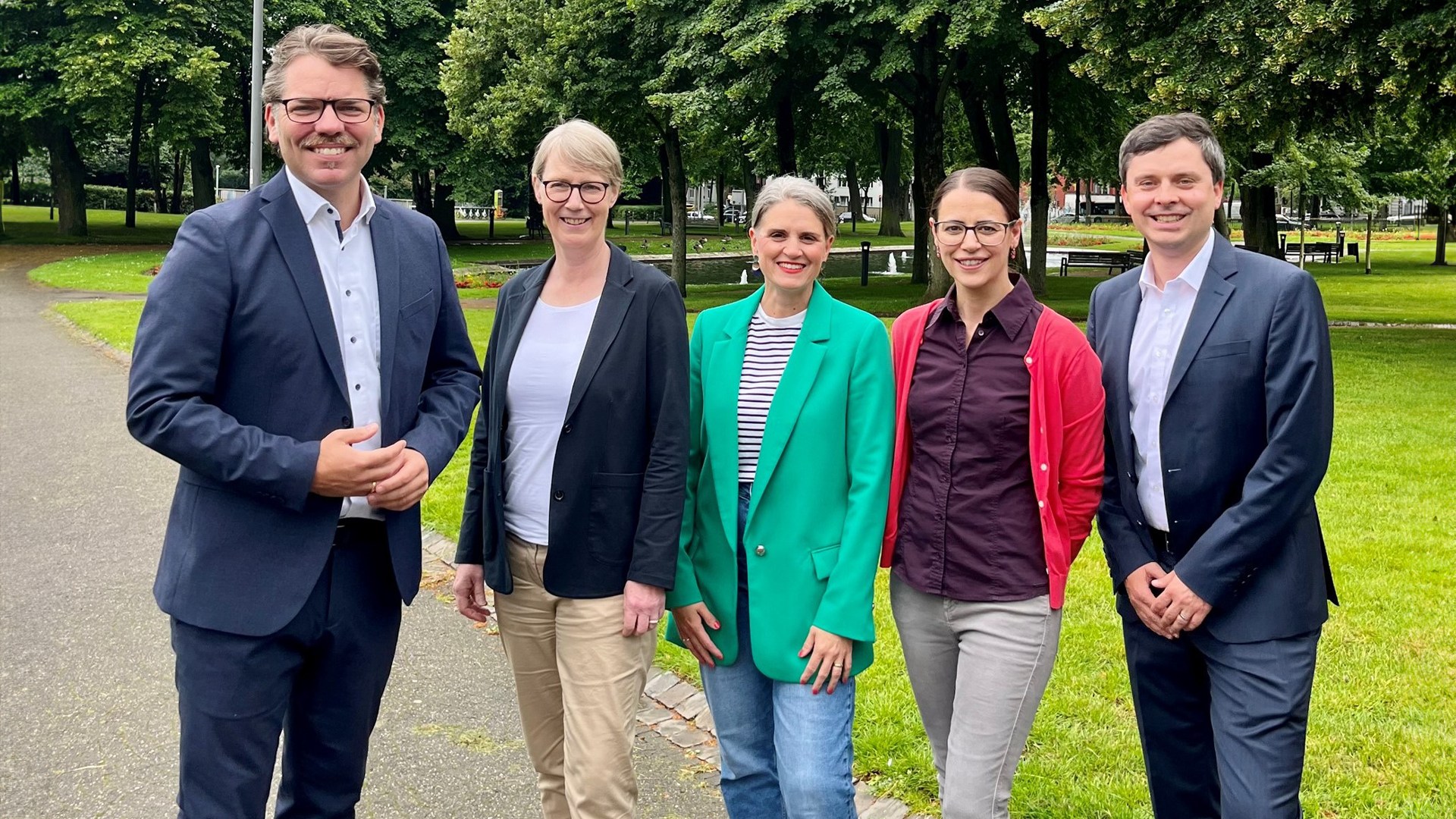
Presentation of the Meeting & Event Barometer for Aachen. From left to right: Thomas Hissel, Councillor for Housing, Social Affairs and Economy, Kristina Wulf, Operations Manager Eurogress Aachen, Katrin Hissel and Caroline Noerenberg, both on the Board of aachen tourist service, and Philipp Piecha, Head of Business Development at IHK Aachen. Photo Eurogress Aachen
Event planners also need to rethink their requirements in terms of flexibility, firstly because of the ability to rebook and secondly because of shorter lead times. Whereas large congresses used to have a lead time of two years, this has now fallen to less than a year in some cases. Wulf cites the International Conference on Photochemistry as an example. The enquiry for the five-day congress with 800 participants came in March for July 2025. "This shortened planning time condenses everything," says Wulf. Her team is being trained in agility and technology and is trying to make everything possible in the shorter time frame. Wulf has her employees in mind. After all, everything has to be kept open for longer because the customer changes their mind or the number of participants changes and seating or technology has to be changed shortly beforehand. Wulf understands this, as there is greater uncertainty, which is why people book for events at short notice. Despite this, the event market in Aachen is developing well and, according to the Meeting & Event Barometer for Aachen, will reach 6,680 events and 1.2 million participants in 2023. Aachen's event venues recorded an increase in turnover of 21.8 per cent. "We hadn't expected to reach almost the level we had before the coronavirus pandemic so quickly," said Kristina Wulf, commenting on the results. For her, this is a clear indication of the importance of event venues, "which are simply the best platform for personal interaction and the live experience". Her colleague André Kaldenhoff agrees wholeheartedly: "Congresses remain essentially a people's business - we shouldn't lose sight of that." In September, he is expecting the Congress of the German Society of Urology and the Congress of Gastroenterology and Visceral Surgery, Visceral Medicine at the Congress Centre Leipzig.
New for our international readers:
For the first time, we are offering an English version of our magazine in addition to the German edition. The translation was made with the help of AI and is currently in the test phase. We’d love to hear your feedback on this new service!
